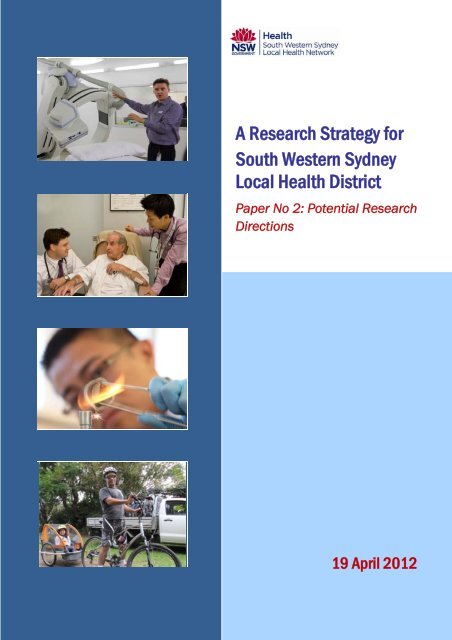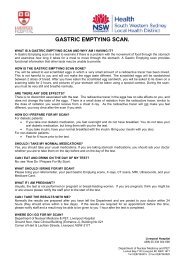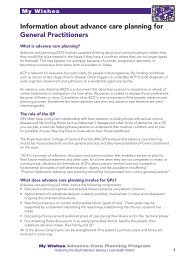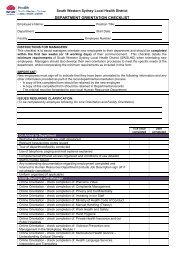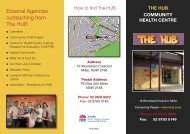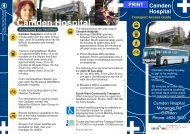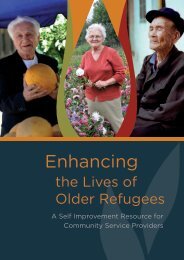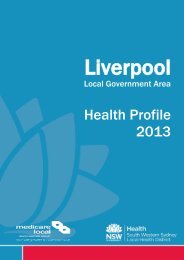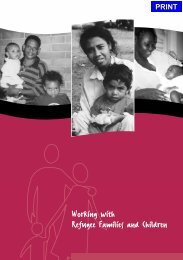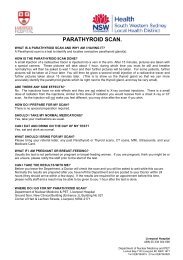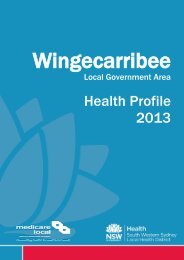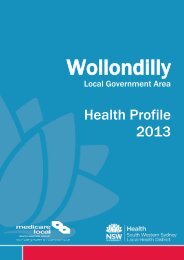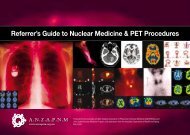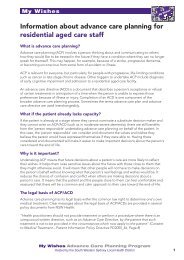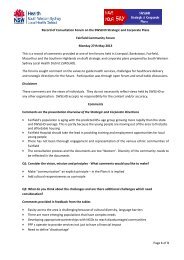A Research Strategy for South Western Sydney Local Health District
A Research Strategy for South Western Sydney Local Health District
A Research Strategy for South Western Sydney Local Health District
You also want an ePaper? Increase the reach of your titles
YUMPU automatically turns print PDFs into web optimized ePapers that Google loves.
A <strong>Research</strong> <strong>Strategy</strong> <strong>for</strong><br />
<strong>South</strong> <strong>Western</strong> <strong>Sydney</strong><br />
<strong>Local</strong> <strong>Health</strong> <strong>District</strong><br />
Paper No 2: Potential <strong>Research</strong><br />
Directions<br />
19 April 2012
A <strong>Research</strong> <strong>Strategy</strong> <strong>for</strong> <strong>South</strong> <strong>Western</strong> <strong>Sydney</strong> <strong>Local</strong> <strong>Health</strong> <strong>District</strong> – Paper No. 2 Potential Directions Final April 2012<br />
Table of Contents<br />
Executive Summary ................................................................................................................................. 1<br />
Introduction .............................................................................................................................................. 2<br />
Consultation Process ............................................................................................................................... 2<br />
Vision .......................................................................................................................................................... 3<br />
Potential Strategies .................................................................................................................................. 4<br />
1. Strengthening <strong>Health</strong> <strong>Research</strong> Leadership Across <strong>South</strong> <strong>Western</strong> <strong>Sydney</strong> ...................... 4<br />
2. Developing Priorities and Innovation <strong>for</strong> <strong>Research</strong> ................................................................ 5<br />
3. Building <strong>Research</strong> Capability .................................................................................................... 6<br />
4. Building Work<strong>for</strong>ce Capacity to Undertake <strong>Health</strong> <strong>Research</strong> ............................................. 8<br />
5. Increasing Community Interest and Participation in <strong>Health</strong> <strong>Research</strong> ............................... 9<br />
6. Strengthening <strong>Research</strong> Infrastructure Enablers .................................................................. 10<br />
7. Improving Monitoring of Per<strong>for</strong>mance and Implementation ............................................ 11
A <strong>Research</strong> <strong>Strategy</strong> <strong>for</strong> <strong>South</strong> <strong>Western</strong> <strong>Sydney</strong> <strong>Local</strong> <strong>Health</strong> <strong>District</strong> – Paper No. 2 Potential Directions Revised March 2012<br />
Executive Summary<br />
In October 2011, the <strong>Research</strong> and Teaching Committee of the Board of <strong>South</strong> <strong>Western</strong><br />
<strong>Sydney</strong> <strong>Local</strong> <strong>Health</strong> <strong>District</strong> (SWSLHD) requested the development of research strategic plan<br />
to embed a research ethos across LHD activities, with longer term (10 year) and shorter term<br />
(5 year) strategies.<br />
The planning process initiated within the <strong>District</strong> occurs within the context of considerable<br />
change in the way in which health services are managed, structured and funded and at a<br />
local level, demographic changes in the size and age structure of the population. It builds on<br />
considerable work nationally and within NSW to achieve a strategic and more focused<br />
approach to health research and improve the way it is coordinated and leveraged. It also<br />
builds on the growing depth of expertise in health research within <strong>South</strong> <strong>Western</strong> <strong>Sydney</strong>, the<br />
establishment of new health researcher units within the <strong>District</strong> including the Ingham Institute<br />
of Applied Medical <strong>Research</strong> and the opportunities created through new and emerging<br />
partnerships with universities and other groups.<br />
Over a four month period, consultation occurred with a range of groups including senior<br />
researchers, senior university leaders, clinical leaders and senior managers, consumers, staff<br />
and other interested groups about the issues facing health researchers within this <strong>District</strong> and<br />
potential strategies which could be implemented to improve research activity.<br />
Two papers have been developed which summarise the results of this consultation. These<br />
papers have been developed to encourage further discussion and to assist in clarifying the<br />
potential directions that SWSLHD could take in enhancing health research. The first paper<br />
addresses the issues faced by local health researchers. This includes concerns with leadership<br />
and direction, priority setting and innovation, the need to build research capability including<br />
work<strong>for</strong>ce capacity, and the need to focus on infrastructure enablers that support a<br />
flourishing research environment.<br />
The second paper (this paper) considers each of these strategic issues and outlines the<br />
potential strategic areas <strong>for</strong> development. The directions outlined focus on: strengthening<br />
health research leadership; developing priorities and innovation <strong>for</strong> research; building<br />
research capability and work<strong>for</strong>ce capacity to undertake health research; increasing<br />
community interest and participation in health research; strengthening research<br />
infrastructure enablers; and improving monitoring of per<strong>for</strong>mance and implementation.<br />
Following further consultation, the <strong>Research</strong> <strong>Strategy</strong> will be finalised.<br />
SWSLHD | 1
A <strong>Research</strong> <strong>Strategy</strong> <strong>for</strong> <strong>South</strong> <strong>Western</strong> <strong>Sydney</strong> <strong>Local</strong> <strong>Health</strong> <strong>District</strong> – Paper No. 2 Potential Directions Revised March 2012<br />
Introduction<br />
In October 2011, the <strong>Research</strong> and Teaching Committee of the <strong>South</strong> <strong>Western</strong> <strong>Sydney</strong> <strong>Local</strong><br />
<strong>Health</strong> <strong>District</strong> Board requested that a research strategic plan was developed to embed a<br />
research ethos across LHD activities, with longer term (10 year) and shorter term (5 year)<br />
strategies. The major aims of the SWSLHD <strong>Research</strong> <strong>Strategy</strong> would be to:<br />
<br />
<br />
<br />
<br />
<br />
<br />
<br />
Support and further develop the capacity <strong>for</strong> research across the SWSLHD.<br />
Enhance the profile of current research in the SWSLHD.<br />
Strengthen the quality and quantity of research in the SWSLHD.<br />
Encourage new researchers, including junior staff, and, sustain the commitment to<br />
research of SWSLHD personnel in management, support and research roles.<br />
Identify the resourcing required to implement the strategies in the Plan and identify<br />
potential sources of funding.<br />
Develop governance arrangements which ensure accountability and responsibility <strong>for</strong><br />
research conducted according to ethical principles, scientific, regulatory and<br />
professional standards and the principles of risk management<br />
Ensure structures support creativity and lead to research which improves health and<br />
health service provision.<br />
The development of the <strong>Research</strong> <strong>Strategy</strong> builds on the considerable achievements in<br />
health research that have occurred over the last decade in <strong>South</strong> <strong>Western</strong> <strong>Sydney</strong>. These are<br />
reflected in the endeavours and successes of individual researchers, clinicians and research<br />
units. They are also reflected in the development of the Ingham Institute of Applied Medical<br />
<strong>Research</strong>, the considerable benefits it offers to health research in <strong>South</strong> <strong>Western</strong> <strong>Sydney</strong> and<br />
the collaborative and cooperative partnership that it has with the <strong>District</strong>.<br />
Consultation Process<br />
As part of the process to develop the <strong>Research</strong> <strong>Strategy</strong>, consultation occurred with a broad<br />
cross-section of stakeholders. This consultation included:<br />
Interviews with SWSLHD senior health researchers and <strong>District</strong> Executive and key<br />
research partners such as universities<br />
written submissions (via questionnaire) from SWSLHD Clinical Stream Directors and<br />
General Managers<br />
targeted meetings on specific issues or with specific groups e.g. Aboriginal people,<br />
people from culturally and linguistically diverse (CALD) backgrounds, Consumer and<br />
Community Council and networks, and clinical trial nurses/coordinators<br />
discussions with managers of SWSLHD support services<br />
an on-line survey <strong>for</strong> staff (completed by two hundred and <strong>for</strong>ty two staff).<br />
The comments from the consultation were themed to identify the strategic issues and<br />
concerns that required consideration in the <strong>Strategy</strong>. These were summarised in Paper No. 1<br />
Issues.<br />
The consultation process identified ideas and suggestions <strong>for</strong> research strategic leadership<br />
and direction within the <strong>District</strong>. This paper identifies potential directions and strategies<br />
identified through the consultation process. These directions require further consideration and<br />
discussion.<br />
SWSLHD | 2
A <strong>Research</strong> <strong>Strategy</strong> <strong>for</strong> <strong>South</strong> <strong>Western</strong> <strong>Sydney</strong> <strong>Local</strong> <strong>Health</strong> <strong>District</strong> – Paper No. 2 Potential Directions Revised March 2012<br />
Vision<br />
The Board of <strong>South</strong> <strong>Western</strong> <strong>Sydney</strong> recognises the importance of research in improving the<br />
health of the community and improving patient care, and in attracting and retaining highly<br />
skilled health practitioners.<br />
The vision <strong>for</strong> health research in <strong>South</strong> <strong>Western</strong> <strong>Sydney</strong> is that:<br />
<strong>Research</strong>ers in <strong>South</strong> <strong>Western</strong> <strong>Sydney</strong> have a reputation <strong>for</strong> high quality health<br />
research that improves the health and health outcomes of local communities<br />
and has broad applicability nationally and internationally.<br />
SWSLHD | 3
A <strong>Research</strong> <strong>Strategy</strong> <strong>for</strong> <strong>South</strong> <strong>Western</strong> <strong>Sydney</strong> <strong>Local</strong> <strong>Health</strong> <strong>District</strong> – Paper No. 2 Potential Directions Revised March 2012<br />
Potential Strategies<br />
1. Strengthening <strong>Health</strong> <strong>Research</strong> Leadership Across <strong>South</strong> <strong>Western</strong> <strong>Sydney</strong><br />
1.1 Develop a <strong>District</strong>-wide Approach to <strong>Research</strong> Leadership<br />
1.1.1 Develop a SWSLHD <strong>Research</strong> Policy Statement that emphasises the<br />
importance of health research, the benefits to the health service and<br />
community, the role of managers and staff in encouraging research and<br />
expectations including recognition of SWSLHD in multicentre studies.<br />
1.1.2 Implement a Communication <strong>Strategy</strong> targeted to existing and future staff<br />
which includes:<br />
a. Development of a <strong>Research</strong> webpage which provides in<strong>for</strong>mation<br />
about research undertaken in the <strong>District</strong>, grants and financial and other<br />
supports available, and achievements using print and audio.<br />
b. Coverage of research achievements (such as new research<br />
qualifications, <strong>for</strong>ums and research papers) in internal and public <strong>for</strong>ums<br />
and media.<br />
c. An annual research report which summarises achievements in research<br />
and research related activities and progress in implementing the<br />
<strong>Research</strong> <strong>Strategy</strong>.<br />
d. Reporting of research in all facilities.<br />
1.1.3 Include a research strategy/ies in all <strong>District</strong> strategic, clinical and service<br />
plans and extra-ordinary funding proposals.<br />
1.1.4 Build research activity into annual per<strong>for</strong>mance agreements of all clinical<br />
directors and facility managers with key per<strong>for</strong>mance indicators (KPIs) to<br />
assess per<strong>for</strong>mance.<br />
1.1.5 Target recruitment in clinical leadership positions to people who are active<br />
researchers or who are actively upgrading their research knowledge and<br />
skills;<br />
1.1.6 Hold annual research <strong>for</strong>ums to showcase new and emerging research in<br />
the <strong>District</strong>. This may include targeted <strong>for</strong>ums which address priority<br />
research areas or professions e.g. Allied <strong>Health</strong>. There is also potential <strong>for</strong><br />
<strong>for</strong>ums in all facilities.<br />
1.2 Clarify the Roles and Relationship between SWSLHD and the Ingham Institute<br />
SWSLHD and the Ingham Institute have a mutually beneficial, collaborative and<br />
cooperative arrangement <strong>for</strong> research that benefits the broader community in<br />
<strong>South</strong> <strong>Western</strong> <strong>Sydney</strong>. This includes the provision by the Institute of research and<br />
research facilities of an international quality and standing which can support the<br />
research activities of SWSLHD prevention and clinical staff.<br />
1.2.1 Review and refine the roles and responsibilities of SWSLHD in research vis a<br />
vis the Ingham Institute. In particular:<br />
a. Appoint a Director of <strong>Research</strong> <strong>for</strong> SWSLHD with clearly articulated<br />
responsibilities in relation to SWSLHD governance and oversight.<br />
SWSLHD | 4
A <strong>Research</strong> <strong>Strategy</strong> <strong>for</strong> <strong>South</strong> <strong>Western</strong> <strong>Sydney</strong> <strong>Local</strong> <strong>Health</strong> <strong>District</strong> – Paper No. 2 Potential Directions Revised March 2012<br />
b. Determine the scope of work and activity <strong>for</strong> the SWSLHD <strong>Research</strong><br />
Office under the direction of the SWSLHD Director of <strong>Research</strong>.<br />
c. Clearly identify those areas of <strong>Research</strong> coordination which are the<br />
within the remit of SWSLHD to support research and those which are<br />
within the remit of the Ingham Institute and define the contributions of<br />
each to these activities.<br />
d. Where research units are jointly funded by SWSLHD and the Ingham<br />
Institute, define the role, reporting relationships and accountabilities <strong>for</strong><br />
research coordination and support.<br />
e. Establish a budget <strong>for</strong> the SWSLHD <strong>Research</strong> Director and <strong>Research</strong><br />
Office.<br />
1.2.2 Maintain a close and cooperative working relationship with the Ingham<br />
Institute through:<br />
a. The ongoing involvement of SWSLHD senior staff in the Board of the<br />
Ingham Institute;<br />
b. Consultation with the Ingham Institute in strategic planning and<br />
development of new service initiatives.<br />
2. Developing Priorities and Innovation <strong>for</strong> <strong>Research</strong><br />
2.1 Develop <strong>District</strong>-wide Stream Priorities <strong>for</strong> <strong>Research</strong><br />
2.1.1 Require <strong>Research</strong> Streams to develop five year plans which identify key<br />
issues, priority research agendas and directions. These should:<br />
‣ be aligned where appropriate to NSW health and medical priorities;<br />
‣ include attention to national imperatives in Aboriginal health;<br />
‣ identify expertise within the research stream;<br />
‣ clearly identify the impacts on the health of CALD communities and<br />
include research which targets communities with poorer health<br />
outcomes;<br />
‣ specify the priorities <strong>for</strong> clinical research, clinical trials, biomedical,<br />
translational, population health, and health policy and/or health<br />
services;<br />
‣ incorporate projects which are innovative and/or support translation<br />
into practice and strategies which build capacity within the research<br />
stream e.g. regular journal clubs, interdisciplinary research meetings,<br />
and research rounds building supported by teleconferencing capability.<br />
2.1 Develop <strong>Research</strong> in new and Emerging Priority Areas<br />
2.1.1 Develop research expertise which prevent major health problems <strong>for</strong> <strong>South</strong><br />
<strong>Western</strong> <strong>Sydney</strong> communities e.g. overweight and obesity.<br />
2.1.2 Seek expressions of interest from Clinical Streams and Networks to establish<br />
Clinical Academic Units in priority areas.<br />
2.1.3 In collaboration with local Aboriginal people and organisations, undertake<br />
and develop population health and health services research which<br />
addresses health problems in the Aboriginal community.<br />
SWSLHD | 5
A <strong>Research</strong> <strong>Strategy</strong> <strong>for</strong> <strong>South</strong> <strong>Western</strong> <strong>Sydney</strong> <strong>Local</strong> <strong>Health</strong> <strong>District</strong> – Paper No. 2 Potential Directions Revised March 2012<br />
2.1.4 In collaboration with the <strong>South</strong> <strong>Western</strong> <strong>Sydney</strong> Medicare <strong>Local</strong> and the<br />
General Practice Unit Fairfield, strengthen research in primary health care in<br />
areas of shared clinical priorities i.e. mental health, complex care and<br />
continuity of care building on new technology and new alignment of<br />
services.<br />
2.1.5 In collaboration with the <strong>South</strong> <strong>Western</strong> <strong>Sydney</strong> Medicare <strong>Local</strong>, undertake<br />
research in new models of care and management in the new Integrated<br />
Primary and Community Care Centres and related primary health services<br />
planned <strong>for</strong> the <strong>South</strong> West Growth Centre. Include attention to<br />
technology, access to research expertise and leadership, and capacity<br />
building <strong>for</strong> staff and general practitioners.<br />
2.1.6 Incorporate a research focus in the development of all new services and<br />
other initiatives in all facilities.<br />
2.1.7 Building on new infrastructure, further develop research in:<br />
a. cancer treatment utilising the new <strong>Research</strong> Radiation Oncology Bunker<br />
at Liverpool;<br />
b. student and work<strong>for</strong>ce education and models <strong>for</strong> translating research<br />
and evidence into practice in the new Clinical Skills and Simulation<br />
Centre at Liverpool.<br />
2.1.8 Lever off state-wide initiatives and new partnerships and the<br />
redevelopment of Campbelltown Hospital as a teaching hospital with the<br />
University of <strong>Western</strong> <strong>Sydney</strong> to develop a stronger focus on Paediatrics<br />
and Maternity services.<br />
2.1.9 In partnership with local Aboriginal organisations and communities develop<br />
and fund projects which seek to implement existing knowledge in effective<br />
models of care <strong>for</strong> Aboriginal people.<br />
3. Building <strong>Research</strong> Capability<br />
3.1 Management of <strong>Research</strong><br />
3.1.1 In consultation with clinical streams and facilities develop a <strong>District</strong>-wide<br />
approach to the allocation of dedicated time <strong>for</strong> research.<br />
3.1.2 Incorporate the requirement to participate in research into the job<br />
descriptions of all clinical staff and evaluate participation through annual<br />
per<strong>for</strong>mance reviews.<br />
3.1.3 Require all services to report their research per<strong>for</strong>mance.<br />
3.2 Develop Specialist <strong>Research</strong> Support<br />
3.2.1 Establish a comprehensive SWSLHD Statistical Support Unit in conjunction<br />
with Ingham, UNSW and UWS to provide a broad range of statistical<br />
services and advice <strong>for</strong> all phases of research. This includes randomisation<br />
services, bioin<strong>for</strong>matics, health economics and survey methodology with<br />
advice provided at a project level and involvement in broader work<strong>for</strong>ce<br />
capacity building strategies.<br />
3.2.2 Implement a research small grant fund to support research projects which<br />
are tied to successful grants and <strong>District</strong> priorities.<br />
SWSLHD | 6
A <strong>Research</strong> <strong>Strategy</strong> <strong>for</strong> <strong>South</strong> <strong>Western</strong> <strong>Sydney</strong> <strong>Local</strong> <strong>Health</strong> <strong>District</strong> – Paper No. 2 Potential Directions Revised March 2012<br />
3.3 Develop In<strong>for</strong>mation Retrieval Capability<br />
3.3.1 Improve in<strong>for</strong>mation retrieval and systematic search capability by<br />
consulting with Medical Librarians in initial phases of research project<br />
design.<br />
3.3.2 Trial and purchase new electronic resources e.g. Dynamed to broaden the<br />
range of in<strong>for</strong>mation which researchers can access through Medical<br />
Libraries.<br />
3.3.3 Develop affiliations between medical libraries and universities to improve<br />
access to additional data bases held by University libraries.<br />
3.3.4 Increase flexibility in meeting in<strong>for</strong>mation needs e.g. short term purchase of<br />
journals, trial/purchase of new databases through development of new<br />
funding models such as donations and sponsorship.<br />
3.4 Develop Elite <strong>Research</strong> Expertise<br />
3.4.1 Identify potential elite researchers who require additional support to remain<br />
within SWSLHD and/or who could be recruited to the <strong>District</strong> in priority<br />
areas.<br />
3.4.2 Identify funding sources/sponsors <strong>for</strong> space, expertise and recurrent<br />
funding to support research in <strong>District</strong> priorities. This funding could be used<br />
<strong>for</strong> the appointment of clinical chairs (in collaboration with universities),<br />
senior researchers and/or research managers.<br />
3.4.3 Examine on-costs charges <strong>for</strong> management of research grants to ensure<br />
they are competitive with those of other institutions.<br />
3.4.4 Create a number of multidisciplinary academic units based on the<br />
research streams.<br />
3.5 Increase Clinical Trial Capability<br />
3.5.1 Develop standard operating procedures <strong>for</strong> clinical trials and evaluate their<br />
effectiveness.<br />
3.5.2 Building clinical trial pharmacy capability by;<br />
a. Appointing clinical trial pharmacists to the three main hospitals with<br />
outreach capacity to Fairfield, Braeside and Bowral.<br />
b. Building in flexibility <strong>for</strong> out-of-hours clinical trial pharmacy.<br />
c. Development of processes and capacity to ensure funding is captured.<br />
d. Development of a sustainable funding model through use of<br />
pharmaceutical industry, SWSLHD, SP&T and Ingham Institute funds.<br />
e. Establishing a small seeding fund <strong>for</strong> two years to develop clinical trial<br />
pharmacy capability.<br />
3.5.3 In collaboration with CEWD and universities develop a regular mandatory<br />
training program in Good Clinical Trials Practice.<br />
3.5.4 In collaboration with the research streams, build the capacity of the clinical<br />
work<strong>for</strong>ce to use clinical trials <strong>for</strong> health services research.<br />
3.5.5 In collaboration with the <strong>South</strong> <strong>Western</strong> Area Pathology Service (SWAPS):<br />
SWSLHD | 7
A <strong>Research</strong> <strong>Strategy</strong> <strong>for</strong> <strong>South</strong> <strong>Western</strong> <strong>Sydney</strong> <strong>Local</strong> <strong>Health</strong> <strong>District</strong> – Paper No. 2 Potential Directions Revised March 2012<br />
a. Develop a policy, protocols and processes <strong>for</strong> the management of<br />
human tissue samples including standard operating procedures <strong>for</strong> the<br />
collection, banking, distribution, cataloguing and disposal of samples;<br />
b. Review research pathology arrangements including cost recovery;<br />
c. Provide seeding funding to SWAPS to develop clinical trial capacity;<br />
d. Identify pathology equipment used to support clinical trials and ensure;<br />
effective asset management including sharing of resources.<br />
3.5.6 Develop standardised documentation and minimum data set<br />
requirements.<br />
3.5.7 Review and streamline the SWSLHD Ethics Approval processes.<br />
3.5.8 Investigate and address issues relating to Indemnity.<br />
3.5.9 Investigate cost-effective translation of trials in<strong>for</strong>mation and consent.<br />
4. Building Work<strong>for</strong>ce Capacity to Undertake <strong>Health</strong> <strong>Research</strong><br />
4.1 Build the <strong>Research</strong> Capacity of Early Career <strong>Research</strong>ers<br />
4.1.1 Develop a <strong>Research</strong> Education Program coordinated by the Centre <strong>for</strong><br />
Education and Work<strong>for</strong>ce Development which builds on existing SWSLHD<br />
and university courses, researcher expertise and university collaborations. E-<br />
learning and face-to-face courses would include:<br />
‣ Good Clinical Practice;<br />
‣ Introductory and advanced courses in research skills e.g. research<br />
development and planning, developing collaborations, funding options,<br />
writing successful applications;<br />
‣ Governance and ethics processes;<br />
‣ Legal issues and risk management;<br />
‣ Intellectual property;<br />
‣ Statistics.<br />
4.1.2 Promote research training opportunities provided by external bodies such<br />
as universities e.g. including PhD and health researcher courses.<br />
4.1.3 Establish a <strong>Research</strong> Scholarship Program to provide part financial support<br />
to staff enrolled in a post-graduate research degree course. Include<br />
capacity to target specific health issues and professions.<br />
4.1.4 Develop a Mentoring Program to support early career researchers which<br />
includes identification and education of mentors, individual mentoring and<br />
regular meetings.<br />
4.1.5 Explore and trial the effectiveness of chat-rooms to support emerging<br />
researchers and PhD students.<br />
4.1.6 In consultation with Nursing executives, CANR, CHETRE and clinical nurse<br />
consultants, develop a targeted and coordinated approach <strong>for</strong> increasing<br />
the research skills and outputs of Clinical Nurse Consultants and Clinical<br />
Nurse Specialists.<br />
4.1.7 In partnership with universities, strengthen research in Allied <strong>Health</strong> practice<br />
via the progressive establishment of Clinical Academic Units with Chairs in<br />
Allied <strong>Health</strong>.<br />
SWSLHD | 8
A <strong>Research</strong> <strong>Strategy</strong> <strong>for</strong> <strong>South</strong> <strong>Western</strong> <strong>Sydney</strong> <strong>Local</strong> <strong>Health</strong> <strong>District</strong> – Paper No. 2 Potential Directions Revised March 2012<br />
4.1.8 Develop a Small Grants Program (which is tied to larger research projects)<br />
to enable early and middle career researchers to further develop their<br />
expertise.<br />
4.2 Build the <strong>Research</strong> Capacity of Middle Career <strong>Research</strong>ers<br />
4.2.1 Develop a model <strong>for</strong> conjoint appointments with universities <strong>for</strong> all<br />
professions and supports the development of a community of researchers:<br />
a. which recognises expertise and innovation;<br />
b. outlines the benefits of a conjoint appointment e.g. access to statistical<br />
packages;<br />
c. provides them with an induction package to welcome them;<br />
d. includes a focus on expected per<strong>for</strong>mance.<br />
4.2.2 Provide clinical academic and research fellowships <strong>for</strong> mid and senior<br />
career researchers in priority research areas.<br />
4.2.3 Establish an annual SWSLHD <strong>Research</strong> Prize to recognise and reward<br />
expertise and excellence in research.<br />
5. Increasing Community Interest and Participation in <strong>Health</strong> <strong>Research</strong><br />
5.1 Develop a <strong>District</strong> policy regarding the approach to be used and supports<br />
available <strong>for</strong> engaging patients and the community in research and review local<br />
processes to ensure its effective implementation.<br />
5.2 Consistent with Plain English guidelines, develop in<strong>for</strong>mation <strong>for</strong> consumers (written<br />
and audio/video) about the types and value of research and the ways to<br />
participate in research. Translate this into major community languages.<br />
5.3 Develop and implement a broader Community <strong>Research</strong> Engagement <strong>Strategy</strong> to<br />
increase the community’s knowledge and interest in research e.g. a community<br />
focused webpage, regular local press, general and targeted promotional<br />
in<strong>for</strong>mation <strong>for</strong> waiting areas, and interviews with researchers.<br />
5.4 In collaboration with multicultural health services, develop a Community <strong>Research</strong><br />
Engagement <strong>Strategy</strong> targeted at culturally and linguistically diverse communities<br />
(CALD). This would include:<br />
‣ modification of broader community engagement strategies <strong>for</strong> non-English<br />
speaking communities;<br />
‣ protocols <strong>for</strong> researchers on how to increase participation and target CALD<br />
communities;<br />
‣ guidelines <strong>for</strong> researchers on how to arrange translation and interpretation.<br />
5.5 Develop protocols and provide training to clinicians and researchers in patient<br />
and community engagement, including the process to be used <strong>for</strong> engaging with<br />
Aboriginal people and people from CALD communities.<br />
5.6 Provide a fund <strong>for</strong> translations and use of interpreters to increase participation by<br />
people from CALD communities in research.<br />
5.7 Work with Ingham Marketing and LHD Public Relations to promote the research<br />
achievements of SWSLHD researchers.<br />
SWSLHD | 9
A <strong>Research</strong> <strong>Strategy</strong> <strong>for</strong> <strong>South</strong> <strong>Western</strong> <strong>Sydney</strong> <strong>Local</strong> <strong>Health</strong> <strong>District</strong> – Paper No. 2 Potential Directions Revised March 2012<br />
6. Strengthening <strong>Research</strong> Infrastructure Enablers<br />
6.1 Improve SWSLHD Ethics and <strong>Research</strong> Governance Office Activity<br />
6.1.1 Increase staffing in the SWSLHD Ethics and <strong>Research</strong> Governance Office to:<br />
‣ facilitate the timely processing of ethics applications;<br />
‣ meet accreditation requirements <strong>for</strong> Lead NSW <strong>Health</strong> Human <strong>Research</strong><br />
Ethics Committee status;<br />
‣ streamline processes and protocols including those relating to adverse<br />
impacts and annual reporting.<br />
6.1.2 Build the expertise of the SWSLHD Ethics Committee and SWSLHD<br />
researchers by developing in<strong>for</strong>mation about health literacy.<br />
6.1.3 Increase the capacity of the SWSLHD Ethics and <strong>Research</strong> Governance<br />
Office to support the implementation of the SWSLHD <strong>Research</strong> <strong>Strategy</strong><br />
and future research activity. In particular:<br />
a. Develop in<strong>for</strong>mation <strong>for</strong> researchers and clinicians in SWSLHD about<br />
research funding and other supports and guidelines to support<br />
appropriate practice.<br />
b. Maintain a data base about research outputs, research related activity<br />
and key points of contact across the <strong>District</strong> including within streams.<br />
c. Establish a SWSLHD <strong>Research</strong> website linked to local research units and<br />
which uses a range of media to promote local research expertise and<br />
achievements and capacity building opportunities.<br />
d. Facilitate and liaise with specialist research services, research streams<br />
and SWSLHD support services to strength broader research supports such<br />
as work<strong>for</strong>ce capacity building enablers, in<strong>for</strong>mation technology,<br />
human resources and finance.<br />
e. Produce an annual report about research achievements.<br />
f. Organise and coordinate an annual research showcase.<br />
6.2 Develop Finance Systems and Accountability to support <strong>Research</strong><br />
6.2.1 Develop a framework <strong>for</strong> financial reporting and accountability of research<br />
which is underpinned by comprehensive stakeholder engagement. This will<br />
include:<br />
‣ processes to ensure the identification of funded research;<br />
‣ policies and processes <strong>for</strong> managing research funds i.e. grant<br />
management, operation, acquittal and closure;<br />
‣ development of guidelines about factors to be considered in ensuring<br />
adequate funding;<br />
‣ timely and efficient financial processes and reporting of research<br />
accounts.<br />
6.2.1 Strengthen the capacity of finance and business managers in facilities and<br />
clinical streams to provide financial support and governance to research<br />
projects and to assess their financial viability.<br />
6.2.2 Investigate opportunities to develop block funding grants from universities.<br />
SWSLHD | 10
A <strong>Research</strong> <strong>Strategy</strong> <strong>for</strong> <strong>South</strong> <strong>Western</strong> <strong>Sydney</strong> <strong>Local</strong> <strong>Health</strong> <strong>District</strong> – Paper No. 2 Potential Directions Revised March 2012<br />
6.3 Develop <strong>Research</strong> Human Resource Management<br />
6.3.1 Develop and implement a <strong>Research</strong> Human Resource <strong>Strategy</strong> which:<br />
‣ identifies models <strong>for</strong> flexible employment of researchers;<br />
‣ includes clearer guidelines and processes <strong>for</strong> research related grading<br />
and award determination appropriate to researchers;<br />
‣ has a single streamlined approval process <strong>for</strong> recruitment of research<br />
staff;<br />
‣ facilitate a streamlined approval process <strong>for</strong> research related<br />
conferences, meeting and mandatory training leave and funding<br />
applications. This will need to be specifically tailored <strong>for</strong> non-medical<br />
staff.<br />
6.4 Develop In<strong>for</strong>mation Technology and Capital Asset Capabilities<br />
6.4.1 In collaboration with the SWSLHD In<strong>for</strong>mation Management and<br />
Technology Division, further develop in<strong>for</strong>mation technology solutions <strong>for</strong><br />
research. This would include:<br />
‣ building a research capability into the electronic medical record (eMR)<br />
with capacity to download deidentified data. This will include<br />
identification of data in<strong>for</strong>mation and reporting requirements,<br />
programming, and guideline development and training.<br />
‣ take full advantage of the IT benefits available through conjoint<br />
appointments with universities.<br />
‣ providing researchers with access to new initiatives e.g. web based online<br />
survey tools.<br />
‣ working with key partner universities to address communication barriers<br />
created by in<strong>for</strong>mation technology firewalls.<br />
6.4.2 In existing and new capital redevelopments, develop a model <strong>for</strong> how and<br />
where clinical and other research will be undertaken on the campus i.e.<br />
within a dedicated <strong>Research</strong>/Education Centre or shared with other<br />
clinical and non-clinical services. In particular consider:<br />
‣ Liverpool (including capacity to expand the Ingham Institute),<br />
Campbelltown and Bankstown-Lidcombe hospitals.<br />
‣ Facilities required reflecting the type of research e.g. access to<br />
bookable clinical rooms and storage, and arrangements <strong>for</strong> clinical and<br />
non-clinical support e.g. backup <strong>for</strong> arrests, arrangements <strong>for</strong> funding<br />
recurrent costs and governance.<br />
7. Improving Monitoring of Per<strong>for</strong>mance and Implementation<br />
7.1 Develop qualitative and quantitative key per<strong>for</strong>mance indicators and a reporting<br />
template which can be used to gauge overall research and research related<br />
activity.<br />
7.2 In this <strong>Strategy</strong>, identify and clearly articulate how success in implementation will<br />
be evaluated.<br />
7.3 Provide annual reports to the <strong>Research</strong> and Teaching Subcommittee of the<br />
SWSLHD Board on research activity and progress in implementing the SWSLHD<br />
<strong>Research</strong> <strong>Strategy</strong>.<br />
SWSLHD | 11


